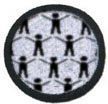In which we come to terms that good science can also be done by the general public. (NHM)
Please leave some good citizen science links below please.
Here, we’ll start: two in the UK (plants), one in North America (birds), and one that is pretty much worldwide (molecules).
– The Big Seaweed Search, NHM
– The Urban Tree Survey, NHM
– Lots of good stuff at Cornell Lab of Ornithology
– Foldit


Love the badge! Let’s find a way for citizen scientists of all stripes to use it via scienceforcitizens.net (we connect citizen scientists to the researchers looking for their help).
-Darlene
When you have a moment, kindly drop me a line so I can learn more about how Science For Citizens.net can offer the badge to our practitioners and volunteers. -Thanks!
Here’s another:
http://www.usanpn.org/
While I hope to eventually get a post graduate degree, for the last year I’ve been doing citizen science and (hopefully) citizen science education by blogging on the internet. This badge will be the first of many to grace my blog.
Thanks guys!
Who needs a post-graduate degree? I have a bachelor’s degree, in chemistry, and have been doing paid science for over 40 years. I have had occasional fantasies about what I could do with a master’s or doctorate, but never pursued it. Perhaps I should have, since apparently my bachelor’s is insufficient to set me apart from the ranks of interested amateurs, if “post-graduate degree” means master’s or doctorate in your definition.
Please check out Project BudBurst (http://BudBurst.org) & the Great World Wide Star Count (http://starcount.org)
How about the fusioneers? http://news.discovery.com/tech/homemade-nuclear-reactor-built-in-nyc.html
I do not have a post graduate degree, and I am paid not only to expiriment, but teach science to kids! And I have a cool lab coat, too ;)
I deserve a badge! OK, so technically I DO have a post graduate degree from Imperial College none-the-less, but I DID write my entire masters thesis on the development of a citizen science accreditation scheme, i.e. an award system for kids and adults who are non-traditional learners to gain a university accredited qualification that they can put on their CVs, in environmental monitoring, or more specifically either in trees, air, soil, water, insects etc. I did it in the UK with a lottery-funded organisation called OPAL. I’ve attached the link to their website, they’ve published downloadable guides for conducting citizen science environmental monitoring investigations in your back garden (I thoroughly enjoyed watching and instructing my Mother in digging up earthworms). They also collect and collate the data, and used to have exhibits in the Natural History Museum. In my thesis process I also attended Citizen Science seminars with the Centre of Ecology and Hydrology – I recommend looking up their LinkedIn and getting on their mailing list! Their website also has access to many free apps for citizen science participation.
http://opalexplorenature.org/
http://www.ceh.ac.uk/citizen-science